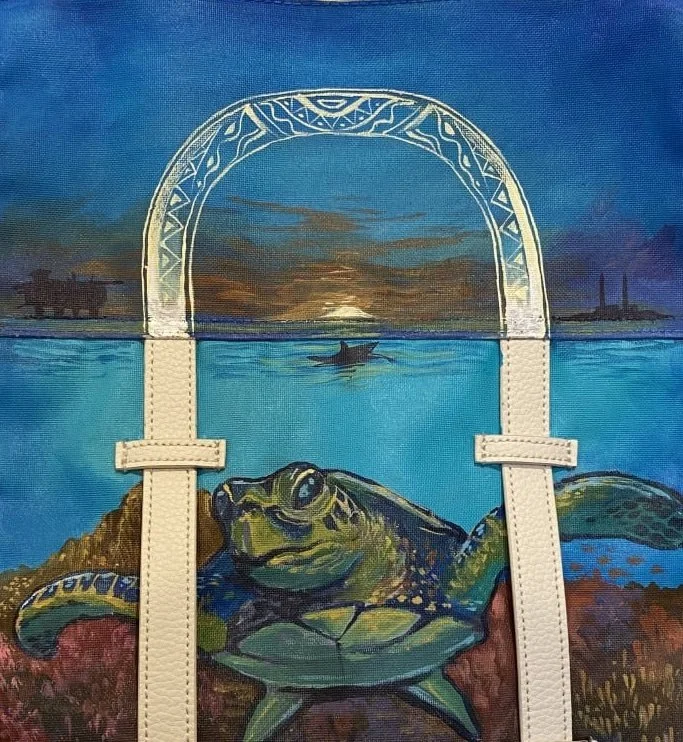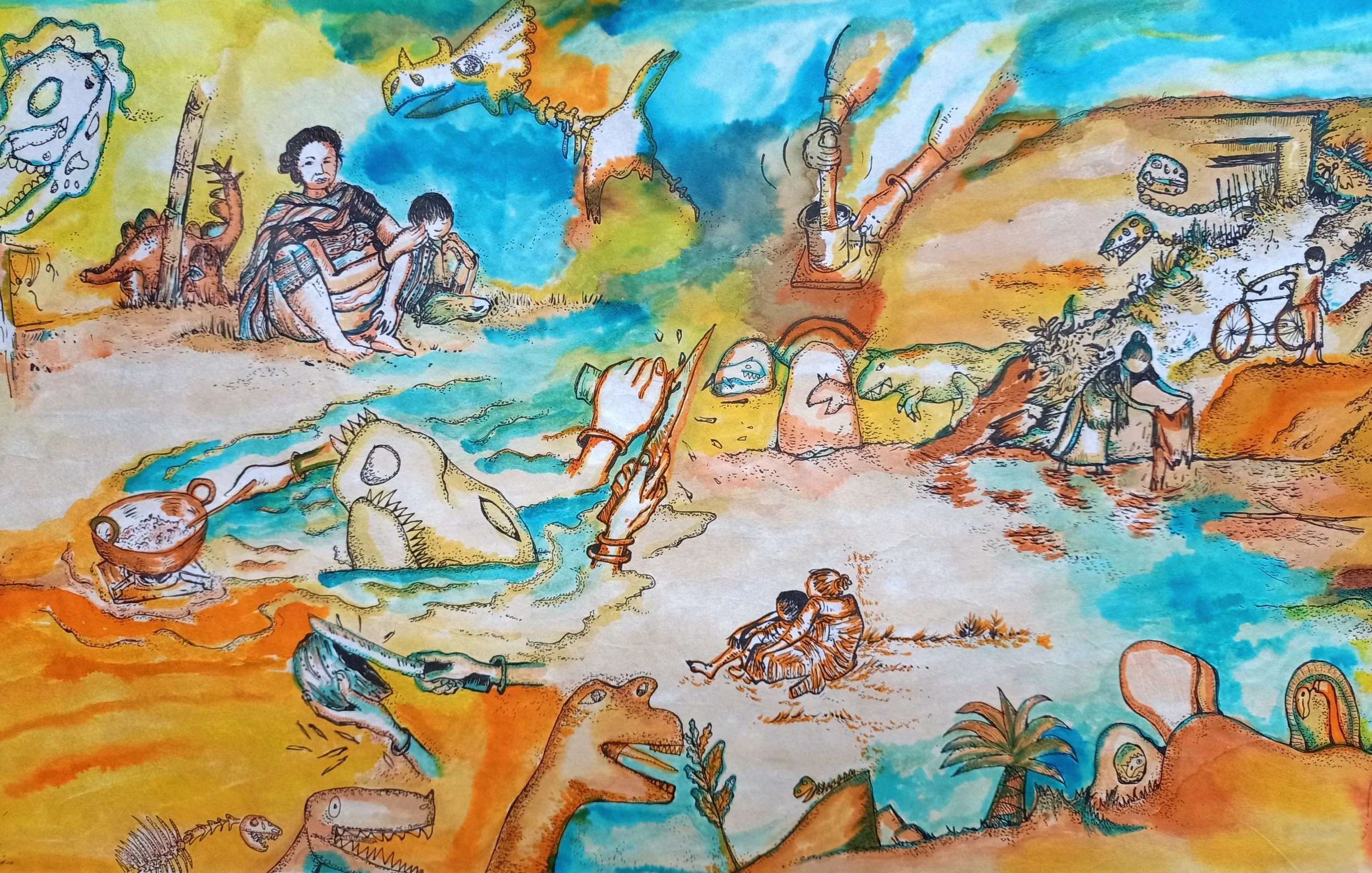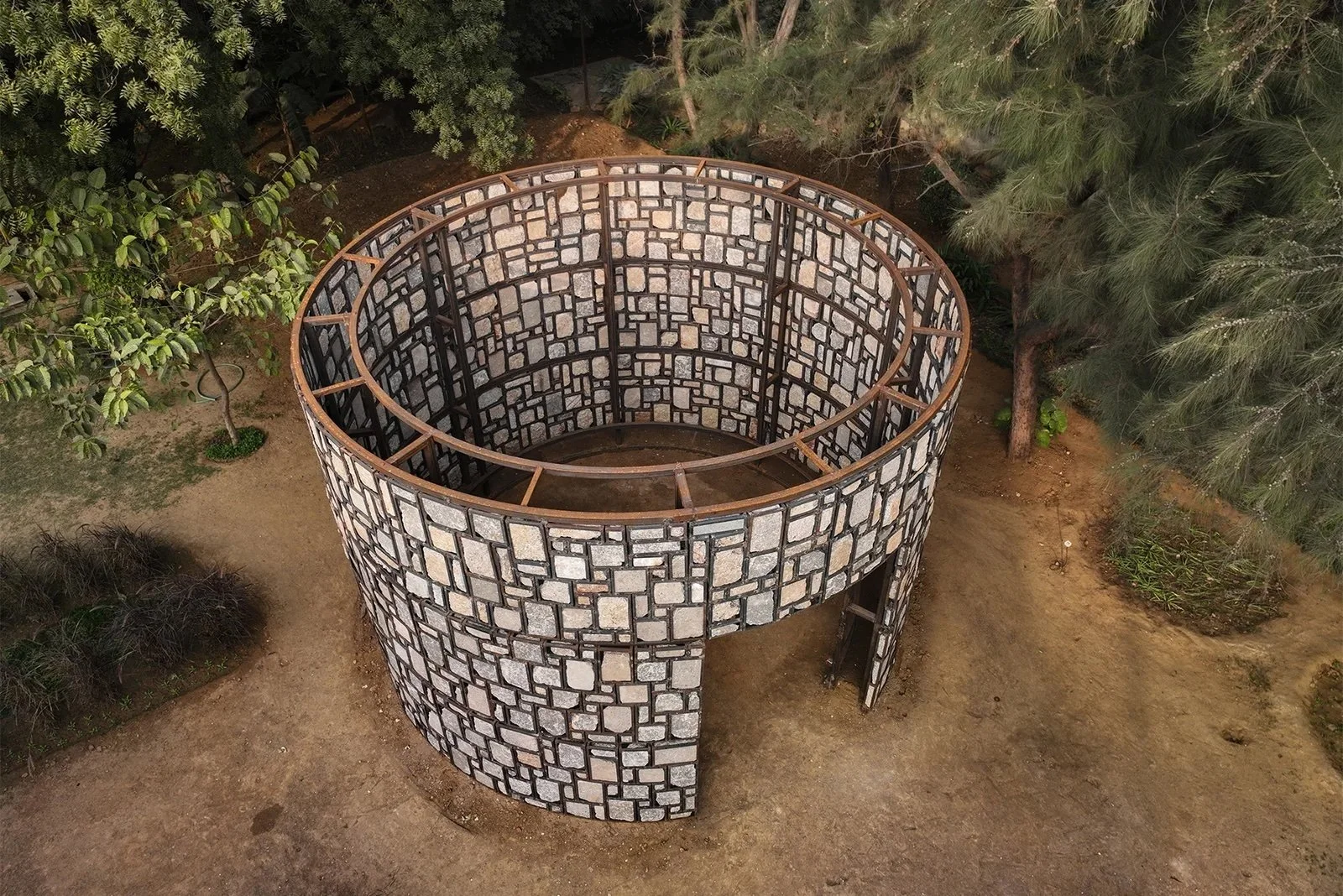Laji of Batanes
By Dorian Merina
The first time I heard Laji, the traditional poetry of the Ivatan people, I was visiting my family's ancestral village in the Northern Philippines. An old woman sat on the second floor of our neighbor's home, in a small, dimly-lit room, and closed her eyes as she began to sing: Sinavung ka paru ninuy, manganak ka paru ninuy...Whose blossom are you? Whose child are you? Her voice filled the room where a group of us had gathered to listen. The song began with pleading questions, then described the devotion and love for a child that persisted despite fiery spirits and frightening sea waves. I was transfixed.
That was many years ago. The woman singing was Filomena Hubalde, the last living Laji singer in the village of Savidug, where my grandmother was born and grew up. Years later, when I began a more formal study and documentation of Laji, Lola Filomena was one of the first singers I returned to in order to record her songs and listen to her stories. Sadly, shortly after I recorded her songs, she passed on. Her knowledge and art are a precious contribution to our Ivatan poetic tradition.
Laji is an indigenous art form, usually performed in a social setting, such as a wake or a pre-wedding ceremony called kayun. It can also be spontaneous and take place in casual gatherings or drinking sessions. Two or more singers recite back and forth, conjuring old lines or inventing new ones to complement or challenge one another, as an audience listens and reacts. Laji is thus collaborative and communal and ever-changing. The poems can be somber, dramatic, playful, or ironic. The form and language are place-based, with Laji singers using certain melodies and phrases distinct to their village. A common feature that Laji share, however, irrespective of place, is the use of a deeply metaphorical vocabulary. Laji holds our cultural knowledge, language, and history, but due to the rise of modernity and digital media, it's also in danger of vanishing.
In 2010, I helped begin a community-based project to document and preserve Laji. Along with a team of teachers and youth, we travelled to every village and island in Batanes to seek out the remaining Laji singers and record their poetry and stories. The result was an audio-visual collection that we made available to our community and the broader public. You may find it at ivatanlaji.com. In Batanes, we used the recordings to showcase our elder singers at gatherings and celebrations, and our digital archive has been accessed by teachers and researchers across the globe. Today, the Laji poetry of singers like Filomena Hubalde can still be heard at festivals and recitals in Batanes, as our tradition awaits the next generation of Laji singers to innovate and carry the art form forward. The poems in this special portfolio of SUSPECT are a sample of our Laji. In addition to Hubalde's poetry, they include that of Ricardo Facuri of the village of Mahatao. Facuri has passed on, and his two examples of Laji here are no longer sung, so we cannot be certain of the melodies that accompany his lyrics. (On a recent visit to his family, his son told me that he recalls listening to his father sing, but does not recall the exact melodies of the poems.) This publication is then an act of revitalization and preservation in order to keep his lyrics from going extinct as well. Since we are a community of islands, much of our Laji features themes of the ocean, fishing, or sea travel, which are central to our lives as Ivatans, and Facuri's poetry demonstrates this concept beautifully. As we say in Ivatan, mangay ta na du taaw… let's go to the sea. I hope you enjoy this Laji. Diyos mamahes!
Duri A Malisipis U Riyes di Valugan
Laji singer: Ricardo Facuri, Mahatao
Duri malisipis u riyes di Valugan,
padpehen na du vanuwa du di Vasay;
taywara anu vinalat u sichu nu akma diyaken
nu tiyas a di a putut ta mabli ko
u riyes a dumapit dimo du duri mo
a piwayaman mo dumngen ko a lipus.
The Rough Currents of Valugan
There the rough currents of Valugan
crash against the port of Vasay,
but the joints for my oars
are not made of the strong heartwood
that can resist breaking,
as I row against the rush of current
to reach you, my beloved relative, where you wait.
Recorded by Dr. Florentino H. Hornedo
Translated by Dorian S. Merina
Irang, Lloydii Mina.
Irang means sea turtle in Ivatan. The turtle is a beautiful and mysterious creature in Batanes.
Sinavung Ka Paru Ñinuy?
Laji Singer: Filomena Hubalde, Savidug
Sinavung ka paru ñinuy? Manganak ka paru ñinuy?
si di chu’ makadidiwi su saluval ku du araw,
si di chu’ makadidiwi su puhaw ku du ahep,
si pinaysasakung ku su ahed ñi Saluwan,
si pinaymalapa ku su pahung du idaúd,
si pinaylumatas ku di suyat ñi manawa,
si turi a dimichimitan ñi apuy ñi añitu,
si turi a rayangirangan nu raya nu vinunu,
si turi a galitijitan ñi sadag ñi nadiman,
a hapen ku na siyay si angdet ku a panawdiyen?
Whose Blossom Are You?
Whose blossom are you? Whose child are you?
Because of whom I endure distraction in the day,
Because of whom I stay awake throughout the night,
And for whom I have been covered by the waves of Saluwan,
For whom I overcome the breakers of the deep sea,
For whom I cross the cursed fields and hills
Where the fire of haunting spirits glimmers,
Where the blood of those who have been slain glows,
Where the carriage of the dead grates against the earth,
And for whom I gather all my courage behind me and carry on?
Recorded and translated by Dorian S. Merina
Iraya, Lloydii Mina.
Iraya is the name of the primary volcano on Batan Island. It is one of the volcanoes that created the island chain many generations ago, and today is a landmark that can still be seen from many points in Batanes.
Duri A Makahaud U Avang
Laji Singer: Ricardo Facuri, Mahatao
Duri a makahaud u avang a inavatan
nu aririn du iraya, a di a patakan
su pamanuwaan; amna makiñin ava
u akma diyaken anu madngey chu
u nakapamanuwa na du madivek a vanuwa.
The Boat Heads toward the Deep Sea
The boat heads toward the deep sea
with its strong oars made of mountain wood,
its final destination is unknown
yet it will be no surprise to hear
that it arrives to a peaceful port at last.
Recorded by Dr. Florentino H. Hornedo
Translated by Dorian S. Merina
Tataya, Lloydii Mina.
Tataya is the Ivatan term for the small boat that fishermen take out to the deep ocean. In the foreground of this painting you can also see the dibang, or flying fish, that are a staple food of the Ivatan during the summer months of April and May.
Dorian S. Merina is a poet, journalist and translator who lives in the northern Philippines. He is the author of Di Achichúk: Poems and Images from Batanes, winner of the 2020 Gintong Aklat Award and a finalist for the Philippines National Book Award. His latest book of poetry, yndio arxipelago, will be published by the University of the Philippines Press in 2025. He is a tribal member of the Ivatan people and is of mixed ancestry (Filipino/Irish/German).
*
Active since 2018, Lloydii Mina is an Ivatan artist whose work reflects the culture, stories, and landscapes of his homeland, Batanes. He is a member of the Yaru nu Artes Ivatan Gallery and has exhibited his art in both local and regional shows. He is a contemporary artist who mixes rural life and urban street art to express powerful stories through his work. He focuses on portraits, culture, and graffiti-style art, using acrylics and mixed media to bring his ideas to life. He is inspired by the differences between people and cultures, blending the quiet beauty of rural life with the energy of city streets, his work speaks to unity, diversity, and the strength found in cultural connection.






‘Style, tone, and form aren’t just decoration—they’re the architecture of meaning... A plastic chalice cannot hold sacred wine.’ – an essay on meaning-making by Chadawan Yuddhara.